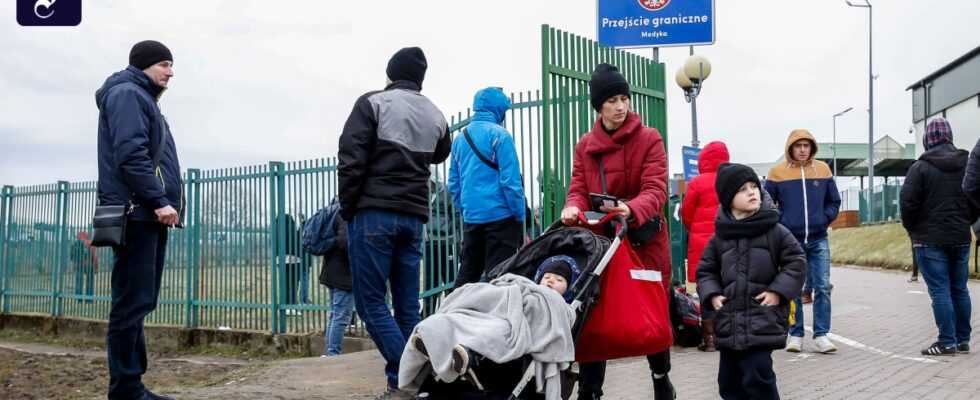MWith an old Ursus tractor they brought the goulash cannon to the border. In the muddy parking lot next to the expressway near Hrebrene, where cars and buses can stop for the first time in Poland. Five older gentlemen with well-groomed, gray mustaches and yellow safety vests from the fire brigade bring the warm potato soup upstairs with their long ladles, give it to the freezing people and add a joke to bring some cheer. Most of those standing here are not refugees. They have traveled hundreds of kilometers east to pick up their parents, daughters and friends who are fleeing Ukraine.
Those who were abruptly thrown into the war in Ukraine on Thursday morning are making slow progress on the other side. It feels like an eternity for those waiting until the next car finally appears between the checkpoints. What is happening on the other side, in Ukraine, you can find out from those who made it. Many have been on the road for several days, packed their things as soon as the first bombs fell on Ukraine, traveled across the country and then had to stand in front of the congested border for hours. The cars are said to be backed up in some places for up to twenty kilometers. In Medyka, one of the closest border crossings from Lviv in Ukraine, people wait for up to 20 hours, all night long, in the cold.

At the border crossing, these men hand out potato soup from the goulash cannon to the arriving refugees.
:
Image: Alexander Haneke
No one can really explain why things are progressing so slowly. In the beginning it was the desperate families who didn’t want to separate. Men of military age have not been allowed to leave the country since Ukrainian President Volodymir Zelenksyj announced general mobilization on Thursday evening. Families who left together after the first bombs had to separate. The fathers somehow back, the women, children and old people further. There are also rumors that the border authorities’ computer systems have been paralyzed by cyber attacks.

Wrapped in blankets: the Ukrainians had to endure the cold for many hours before they could cross the border crossing.
:
Image: Alexander Haneke
In Hrebrene, where the gentlemen with the mustaches operate their goulash cannons, no pedestrians are allowed to cross the border on Saturday evening. It is an expressway and is not intended to be crossed without a car. But many came by taxi or were brought by their husbands. Now they are not allowed to go any further until they are picked up by a car or taken by others. Truck drivers unload entire families that they have brought in driver’s cabs the few hundred meters through no man’s land. Further south, in Korczowa, the border guards have already abandoned this formalism. But everywhere people say that far too few officials have to cope with the rush. A large part of the border troops has apparently been assigned to other parts of the country. But even that is no explanation for the fact that there is hardly any progress.
Poland, meanwhile, is being seized by a wave of helpfulness. Despite all the obstacles, 100,000 refugees from the war are said to have made it to the West. People from all over the country bring trunk loads of essentials to the border: diapers, blankets and warm tea, along with sugary donuts and fruit. Cars have self-painted signs in the windows saying they transport Ukrainians for free. In Korczowa there is a young Russian woman who lives in Kraków and who has loaded the car with groceries with her Ukrainian friend in order to somehow help and to be able to do something against what the army is doing to Ukraine in her homeland.

A wave of helpfulness has broken out in Poland. Food and drinks will be distributed to the arriving people.
:
Image: Alexander Haneke
The streets in the small towns are blocked with thousands of cars. The police are trying to keep order and be lenient. Blue light columns with buses that want to take in refugees keep coming by. Initial reception camps have been set up further back in the country, but most of them look for rooms in the few hotels or move further west to stay with relatives or friends.
